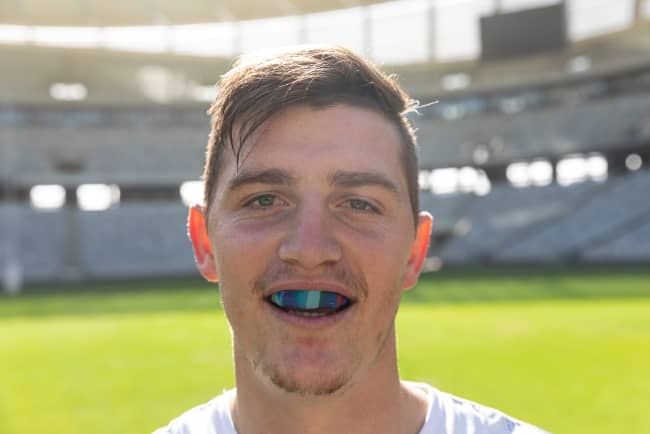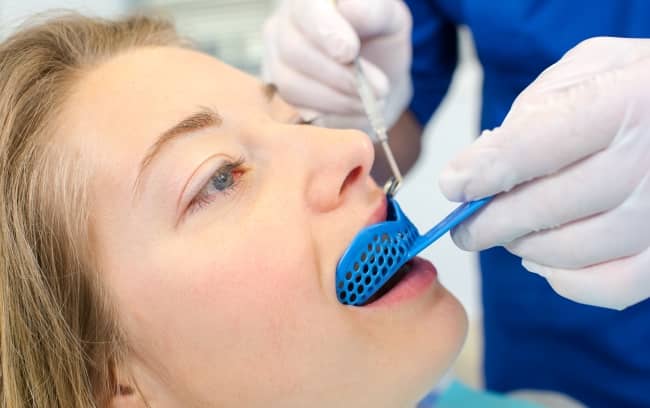Missing or cracked teeth can be painful and expensive to repair. Any individual playing a sport with a risk of injury to the mouth should highly consider wearing a mouthguard. However, we often hear the question, “Can I wear a mouthguard with braces?”.
Here, we’ll cover why it is important to wear a mouthguard, even if you wear braces, and how to find a mouthguard that works with braces.
What Are Mouthguards?
Mouthguards are dental devices that help protect the teeth, gums, and mouth from injury. They are intended to fit securely over the teeth to absorb impact and reduce the risk of trauma to the mouth and teeth during falls or contact sports.
Individuals also use mouthguards to protect the teeth against the side effects of teeth grinding.
The Risks of Not Wearing A Mouthguard
A hard impact on the mouth can lead to serious dental injuries, costly repairs, and pain.
Risks of not wearing a sports mouthguard include:
- Loss of one or more teeth
- Laceration of the cheeks, gums, tongue, or lips, especially if an individual is wearing braces
- Damage to a tooth’s nerve or blood supply
- Crown fracture
- Tooth displacement
- Root fracture
- Chips or cracks in teeth
If a dental injury occurs, it is crucial to seek dental treatment immediately, particularly if a tooth is knocked out or displaced. In some cases, the tooth can be saved if emergency dental treatment is sought early enough.
By wearing a mouthguard, many of these dental injuries can be greatly minimised or prevented.
When Do You Need a Mouthguard?
Various situations make it important to use a mouthguard to protect the teeth and gums.
Individuals can benefit from wearing a mouthguard for the following:
- Teeth clenching or teeth grinding (bruxism)
- Sports with a high risk of falling, including ice skating, gymnastics, mountain biking, or skateboarding
- Contact sports, including rugby, wrestling, lacrosse, volleyball, wrestling, boxing, martial arts, basketball, baseball, etc.
Common Issues With Mouthguards
A poorly fitted mouthguard can lead to various issues. For individuals with braces, a well-fitting mouthguard is especially important.
Common complaints about mouthguards include:
- Difficulty speaking clearly
- Gagging
- Bulkiness
- Discomfort
- Difficulty keeping the mouthguard in place
The Best Mouthguard for Braces
As a general rule, a mouthguard that fits well will provide the most protection. Stock, boil-and-bite, and custom-made mouthguards are the three main types of mouthguards available.
Stock mouthguards are often bulky, offer a low level of protection, can cause breathing and speaking difficulties, and rarely fit well. Boil-and-bite mouthguards are slightly more customised, meaning they offer more protection and a better chance of fitting well.
However, brace wearers have unique needs and benefit from custom-made mouthguards. To make a custom-fitted mouthguard, an impression will be taken of your teeth and sent to a lab. The lab will use your impressions to construct a custom-made mouthguard that is designed to fit your teeth perfectly and comfortably.
Benefits of custom-made mouthguards include:
- Best mouthguard option for brace wearers
- Provides the highest protection for teeth
- Harder to dislodge during sleeping or activities
- More comfortable to wear than a boil-and-bite or stock mouthguards
- Made specifically to conform to your teeth and brackets
Tips for Wearing a Mouthguard During Invisalign Treatment or Metal Braces
If you wear traditional metal braces or are straightening your teeth with Invisalign, there are special considerations when wearing a mouthguard.
Here are the best tips for wearing a mouthguard with braces or aligners.
1. Consider a Custom-Made Mouthguard
The best mouthguard for braces or Invisalign treatment fits closely over your teeth and is comfortable to wear. A custom-made mouthguard is professionally made and designed to cover your braces or aligners to ensure proper fit.
2. See Your Dentist for Regular Mouthguard Fittings
If you wear braces, it is especially important to bring your mouthguard to your dental checkups to ensure it is still fitting properly. As teeth are straightened, your mouthguard may need to be remoulded, adjusted, or replaced.
3. Ask Your Dentist About a Mouthguard for Your Top and Bottom Teeth
Your dentist will determine if you need a mouthguard for your top and bottom teeth. Typically, it is recommended for brace wearers to use both a top and bottom mouthguard. This helps protect the cheeks, gums, and lips from getting cut on the bottom brackets.
4. Protect Your Brackets
During the fitting process, you may need to use dental wax to cover the brackets.
How to Care for a Mouthguard
To keep your mouthguard functioning as it should, it is important to include mouthguard care as part of your oral hygiene routine.
Here are important tips for taking care of your mouthguard:
- Rinse your mouth guard with warm water immediately after wearing it to help prevent the build-up of dental plaque
- Brush your mouthguard gently with a soft-bristled toothbrush and a mild, antibacterial soap (not toothpaste as may damage your mouthguard)
- Do a weekly deep clean of your mouthguard by soaking it in a mix of warm water and an over-the-counter denture cleaner or a combination of warm water and mouthwash (when we fit you with your custom-made mouthguard, ask us for recommendations on the best way to deep clean your mouthguard)
- Always store your mouthguard in its case when you aren’t using it
- Always allow your mouthguard to dry completely before storing it away in the case (putting it away damp allows bacteria to grow)
- Keep your mouthguard away from pets (dogs love to chew on mouthguards!)
- Keep the mouthguard case clean by washing it with soap and water every few days and allowing it to dry completely (placing it in a dishwasher can warp the plastic due to the high temperatures)
- Replace your mouthguard case every 6 months to a year
Have More Questions About Wearing a Mouthguard With Braces?
Finding the best mouthguard for braces does not have to be difficult. Our talented team of dental professionals is here to help.
If you have questions on how to find the best mouthguard for braces or how to wear a mouthguard with braces or Invisalign, please do not hesitate to contact us. Our team of dental professionals would be happy to answer your questions or set up a consultation for you.










